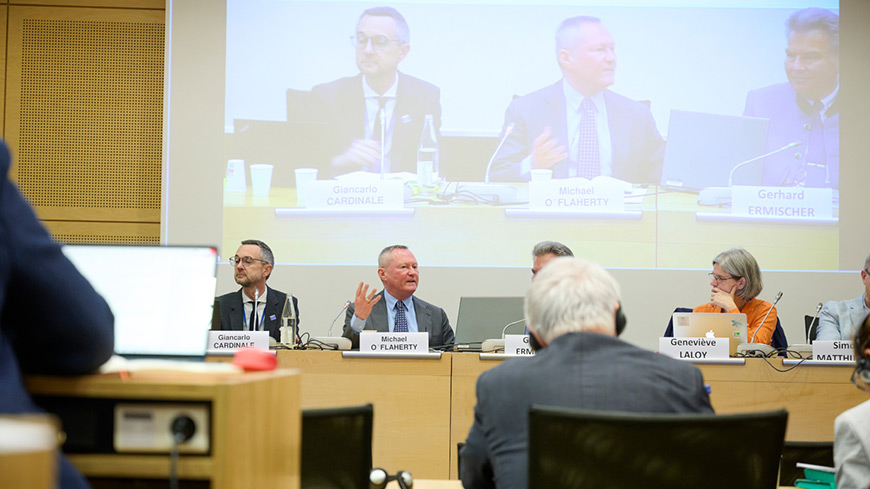Speech delivered at the exchange of views with the Council of Europe's Conference of International Non-Governmental Organisations (CINGO):
“Dear friends,
Thank you for inviting me to this exchange of views with the Council of Europe’s Conference of International non-Governmental Organisations.
This is my first public address since taking up office, and I am truly delighted to have such an opportunity, as civil society is crucial to the promotion and protection of human rights.
NGOs, trade unions, academia, the media, cultural practitioners and faith communities are both the lubricant and a key component of the human rights protection system.
Several examples illustrate this.
The genesis of every human rights norm or idea has come from the heart of civil society – from the reflection on a Universal Declaration of Human Rights by philosophers in Paris to the UN Convention against Torture, which was heavily influenced by the work of Amnesty International.
The fingerprints of civil society can also be seen in the development of our institutional frameworks. I saw this in the negotiations for the establishment of the International Criminal Court, where civil society was instrumental in achieving this remarkable goal.
And civil society is a critical watchdog of the human rights system, challenging it to perform at its best and to maintain its integrity. This aspect is crucial at all levels, from the local to the international.
It is a driving force for reform, often at the forefront of the establishment of national human rights structures. In the particular context of the Council of Europe it plays a crucial role in litigation before the European Court of Human Rights.
Finally, and perhaps most importantly, civil society's heroic defence of human rights, often at considerable personal risk, deserves the deepest respect and gratitude.
Staying with the issue of risk and danger, I acknowledge that these are challenging times for civil society, marked by the pressures of excessive regulation, denial of access to decision-makers, threats and intimidation, and restrictions on such fundamental human rights, as freedom of assembly, expression, and movement.
Such adversities must be seen for what they are: calculated efforts to instil fear and silence civil society.
These threats are not evenly spread. They are very specific to certain geographies and to certain issues.
If you are working on environmental issues, you can face very serious threats and attacks. If you stand up for the human rights of LGBTI people or of women, you can find yourself in an extremely vulnerable and dangerous situation.
Moreover, faith-based groups, such as the Jewish or Muslim communities, face intense scrutiny and pressure.
In the midst of these challenges, the need to protect civil society has risen to unprecedented levels.
As Commissioner, I pledge to prioritise the defence of civil society, continuing the work of my predecessors, and in particular of Dunja Mijatović, who spared no effort in supporting human rights defenders.
What will my pledge look like in practice? Here are five elements.
First, I intend to engage with civil society through continuous dialogue and roundtable discussions, and to consult with them on issues related to specific countries or themes, to ensure that their perspectives are integrated into my analysis and understanding.
Second, I will integrate the civil society perspective into the work programme where relevant, to ensure that issues with a civil society component are thoroughly addressed.
Third, a hallmark of the Commissioner’s role is to support those at risk, and I intend to follow in the footsteps of my predecessors by standing by human rights defenders and rights holders and offering my support wherever possible.
Fourth, I will work closely with partners, including the relevant UN Special Rapporteurs, to strengthen our collective efforts to defend civil society.
Finally, my engagement will extend internally within the Council of Europe, aligning with key initiatives such as the Secretary General's roadmap on civil society, to ensure a coherent and supportive approach.
As I conclude these introductory remarks, allow me to reflect on a moment from the past. Some forty years ago, I began my journey into the world of non-governmental organisations. It was at Amnesty International in Geneva as a wide-eyed student.
Our meetings were held in a cold, drafty building, with the rain coming through the ceiling. But I learnt invaluable lessons there about organisation, accountability, and management. The clarity of the mission - to advocate for prisoners of conscience with unwavering precision - shone through.
And it was there that I saw the real drivers of human rights in action. These were not the bureaucrats or civil servants, but the unsung heroes who, without expectation of recognition or reward, devoted countless hours to the cause of their fellow human beings. This deep commitment to service and the tangible results it produced week after week, such as announcements of individuals released, families reunited, executions halted, underscored the power of collective effort.
This first experience of the NGO world revealed to me the central role of civil society in shaping a better world, a lesson that has stayed with me to this day. I can assure you that the lessons I have learned since then, and throughout my professional life, will continue to inform my commitment to stand with you in our shared quest for a better world.”



